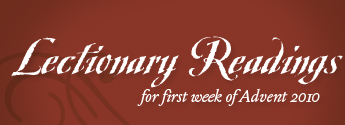
Beginning Again… With Advent
When we submit our lives to what we read in Scripture, we find that we are not being led to see God in our stories but our stories in God’s. God is the larger context and plot in which our stories find themselves.”
– Eugene Peterson
I can still remember the first time I heard the word, “lectionary.” I was sitting in a preaching class at Princeton Theological Seminary in the mid-1970s. The professor casually referred to the lectionary as a guide to devotional reading and preaching that would surely be as familiar to us as the Bible itself. Other students acted as though this was old news. Privately, I was utterly embarrassed because I had never heard of a lectionary!
See, I had grown up in a Southern Baptist church that had never mentioned a lectionary, or for that matter, the “Christian year.” We celebrated Christmas and Easter, of course, with great fanfare. But I had no idea that a season called Advent preceded Christmas, or that twelve additional days of Christmastide followed December 25. I knew nothing of Epiphany, or Ash Wednesday, or Lent. I knew about Palm Sunday, was barely familiar with Good Friday, but had never heard of Maundy Thursday or Holy Saturday. I looked forward to “Trick-or-Treating” on Halloween every year, but didn’t understand that Halloween was All Hallows Eve that preceded All Saints Day.
Even if I had known of these dates and seasons of the Christian year, like most Baptists I would have likely dismissed them as being “too Catholic” to observe. And even if I had been aware of a planned pattern of Scripture readings called the “lectionary,” as a “free Baptist” I might have objected to submitting to an orderly list of readings someone else had planned.
Transforming Rhythms
Have I ever changed! Like so many Baptists, and so many in the Protestant Evangelical world, I have been influenced by the “modern liturgical movement” in a way that has profoundly enriched my Christian life and ministry.
After my seminary experience, I began to use the lectionary selectively to inform my preaching. And I led the churches I pastored to pay attention to the Christian year. I cannot honestly say, however, that the readings of the lectionary nurtured my own soul until I became involved with the Transforming Center almost four years ago. It was through the Transforming Center that I was introduced to the idea of meditating upon the designated lectionary readings during the week preceding the Sunday they were used in worship.
Developing a life-rhythm that allowed me to meditate upon Scripture may not seem terribly profound. But (and this is embarrassing to admit!) I was so accustomed to sermonizing from Scripture that I rarely if ever sat with Scripture just to give God an opportunity to speak into my soul. My experience with The Transforming Center not only convinced me I needed to let Scripture shape my soul before it shaped my sermons. The Center also taught me an ancient meditative practice called lectio divina that gives God ample opportunity to speak into the deep places of my soul, places that desperately need to hear God’s healing, life-giving word.
What I have learned is that if I submit my life to the ancient rhythms of the Christian year, and submit my mind and heart to the recommended readings of the lectionary that parallel the Christian year, God can more readily transform me into the image of his son. Simply put, the more deeply I am rooted in the story of Jesus, the more like Jesus I become.
Since the earliest centuries of the church Christians have followed the rhythms of the Christian year as a means of centering their individual lives and life together around the life of Jesus Christ. The lectionary guides us in living these rhythms by providing a series of Scriptures to be read in private and public worship. As we follow the three-year lectionary cycle, we relive key events in the life of Jesus. Meditating upon these passages gives us an opportunity to center our lives around these events and to learn the lessons contained within them. If we are faithful to this plan of submitting ourselves to God’s written Word, it will become more alive in our hearts. And we will become more like the Living Word, Jesus Christ!
Beginning Again
The liturgical year begins with the first Sunday of Advent—four Sundays before Christmas Day. During these four weeks we prepare for Christ’s advent, or his coming. This is a time of anticipation and longing for the coming of the Messiah. On Christmas we rejoice with the Shepherds that our Savior has been born, and then extend that celebration twelve more days! And on January 6, the Feast of Epiphany, we remember Jesus’ manifestation (epiphany) to the Wise Men, and continue in subsequent Sundays to review Jesus’ earthly ministry.
Since adhering to the Christian year (including the use of lectionary Scripture readings suggested for worship) is meant to foster our spiritual transformation, and since pursuing transformation is what the Transforming Center is all about, once again we will launch a new Christian year together starting on the first Sunday of Advent, November 28. By engaging the lectionary passages for each week of Advent, we will watch and wait for the coming of Christ in the places where we need his presence most. This year we will follow the “Cycle A” assigned readings that will include a passage from the Old Testament, a Psalm, a Gospel reading (typically from Matthew), and a reading from the epistles. Click here to view Cycle A lectionary readings for this Advent/Christmas season. Your Advent reading will arrive a few days before Sunday so you are “reading into” the lectionary passages for that Sunday. Our prayer is that this series will provide you with a few moments of private reflection on the themes of Advent even as you lead others through this busy season.
A Different Kind of Calendar
Robert Webber writes in Ancient-Future Faith that “by observing the church year, time is aligned with the living, dying, rising, and coming of Christ. The Christian, in his or her view of time, makes a dramatic break with a secular view of time and begins to consciously meditate on the aspect of Christ’s life currently being celebrated by the church.”
Our hope, in offering these Advent readings, is that those of us who are leaders in Christ’s Church will use these days and weeks as an opportunity for our own spiritual transformation which is our best preparation for leading others. To do so will, in Webber’s words, require a “dramatic break with a secular view of time”. It will require adherence to an entirely different kind of calendar, one that is focused upon walking with Christ through the seasons of his life and allowing him to teach and transform us as we go.
Click on the link below to access the lectionary readings for the first week of Advent.
Download a PDF of “Beginning Again…With Advent” by clicking here.
—————————————————————-
How are you planning to watch and wait for the coming of Christ this Advent season? Let us know what you think by using the form below.
—————————————————————-
©David Hughes, 2010. Not to be used without permission. (Note: I am indebted to Ruth Haley Barton and David Williamson, Minister of Worship at First Baptist Church, Winston-Salem, NC, for their contributions to this article.)
The purpose of the Beyond Words blog is to offer helpful and hopeful content and conversation that strengthens the souls of leaders and the congregations and communities they serve. All comments are monitored and the TC reserves the right to delete those that are not consistent with this goal and purpose. Access our comments policy.
Join thousands of pastors and spiritual leaders
Receive Beyond Words®, reflections on the soul of leadership. Written by Ruth Haley Barton, each reflection provides spiritual guidance and encouragement for those seeking to be in God for the world.



David, As your fellow “cheated” Baptist in this Transforming Center community, I am so thankful to have you explain it to me. It means more! Since I have not traditionally celebrated anything other than the Advent Sundays in church, I have no idea how I will wait for this Advent yet. So I’ll be glad to read the suggestions of those who have had the blessings in past years. Thanks!
One that I really like is Watch for the Light: Readings for Advent and Christmas published by Orbis books. Phyllis Tickle has a version of the Divine Hours for Christmastide which can be a guide for praying the hours through the Christmas season.
We have missed much in the Evangelical/Pentecostal traditions when the Church year was by passed for faster spiritual process. I drove Rt. 66 with friends this year from Chicago to Santa Monica. It is far more rewarding to go slow and enjoy the travel. So it is with the liturgy of the Church year.
It is good to be back on the Rt. 66 of Christian spirituality.
To slow down and anticipate the birth of our Savior through the Scriptures is a delight to the soul. I will be “waiting” expectantly for each week’s devotion.
I enjoyed the article. I could especially relate to my “Baptist brother” in not having heard of Advent or Maundy Thursday until I started playing the organ and then became Minister of Music at Lutheran Churches. I have found Advent to be a time of personal reflection that is hard to do in a busy season unless it is intentional. My husband started a tradition for our young family 10 years ago. (They are both now in High School)
We read a selection each day of the The Christmas Mystery by Jostein Gaarder (1996). This Norwegian based story looks at each character in the Nativity Story as they prepare for the Holy Day as they are joined together, one at a time, as they “time- travel” through various locations to reach Bethlehem. By committing to this reading each day, we are drawn closer as a family and able to reflect on Advent and on Jesus’ birth in a unique way.
As the manager of a church bookstore I am surprised at the lack of Advent readings that are published. I will be reading what you send. If you have any suggestions about advent devotionals I would love to know.